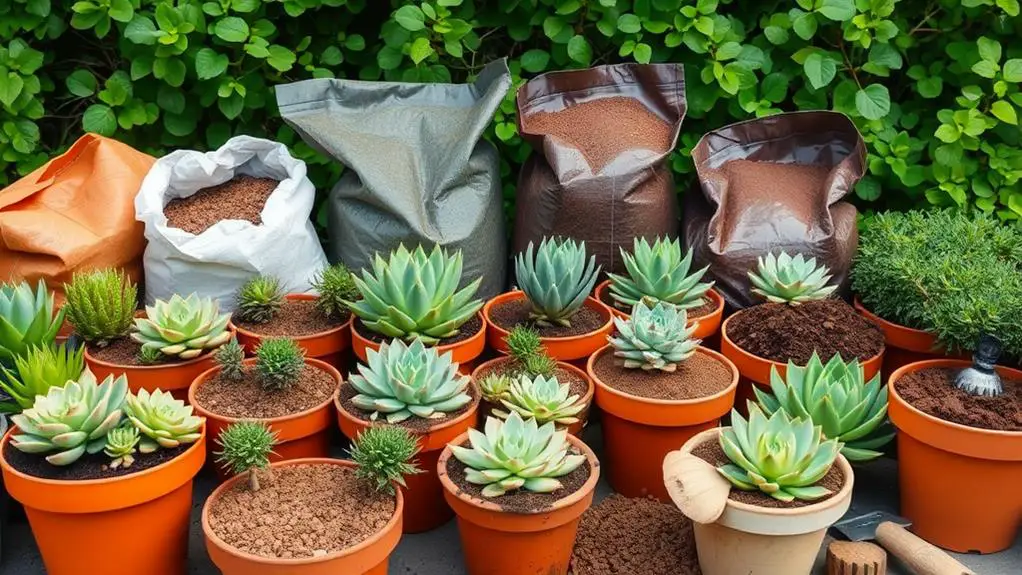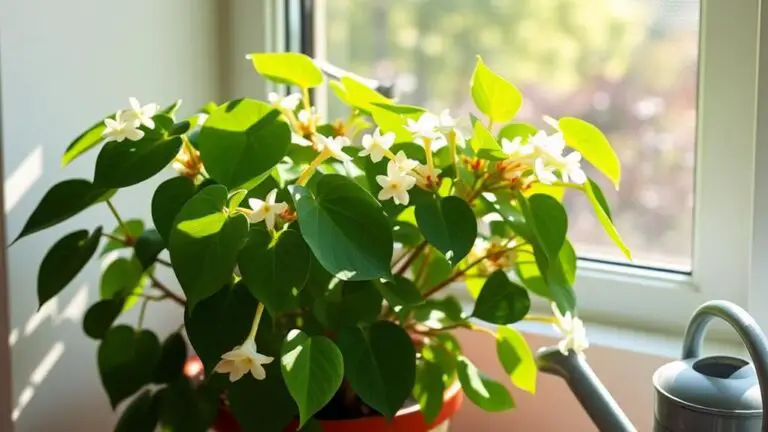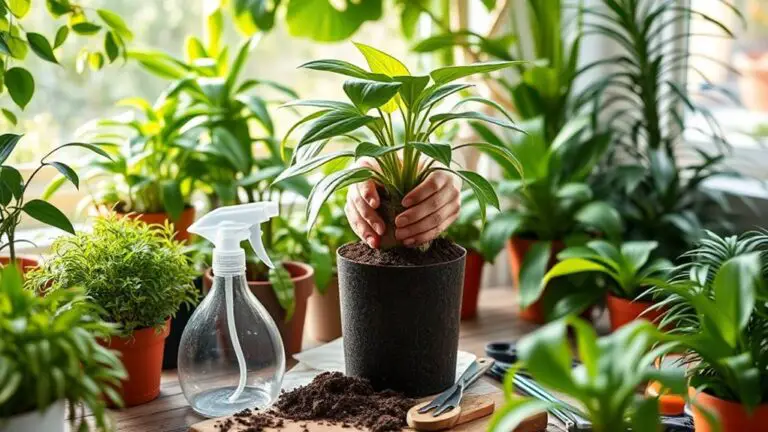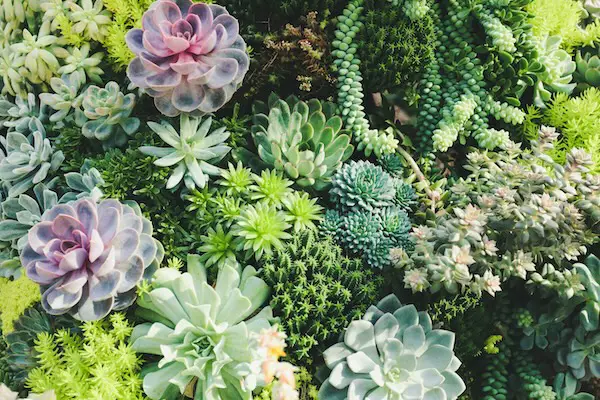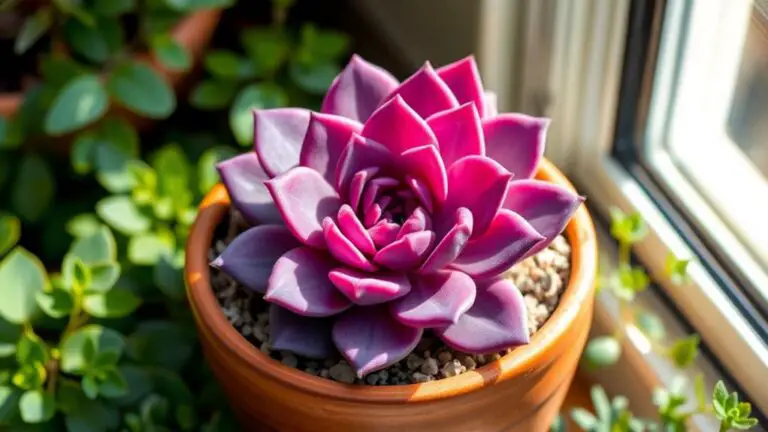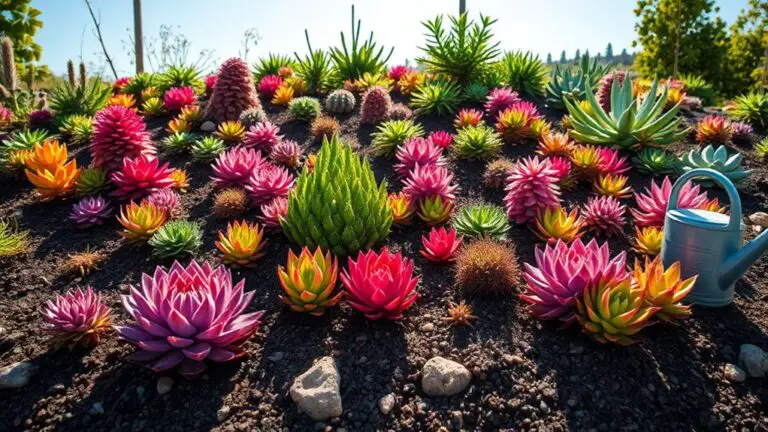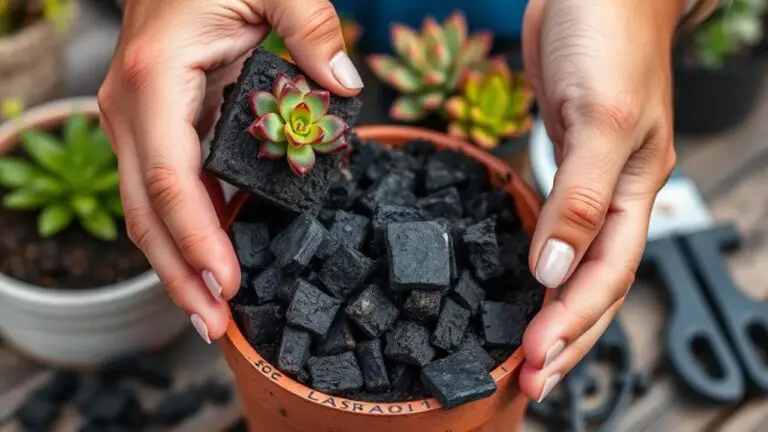Top 5 Recommended Soils and Fertilizers for Healthy Succulents
When caring for succulents, choosing the right soil and fertilizer is essential for their health and growth. You'll need to take into account well-draining soil mixes and appropriate fertilizers to keep your plants thriving. Are you curious about which commercial cactus mixes are best for beginners or which organic ingredients can enhance drainage and nutrient absorption? If you're ready to elevate your succulent care routine, let's explore the top five recommendations for soils and fertilizers that can truly make a difference.
Best Soil Mix for Succulents
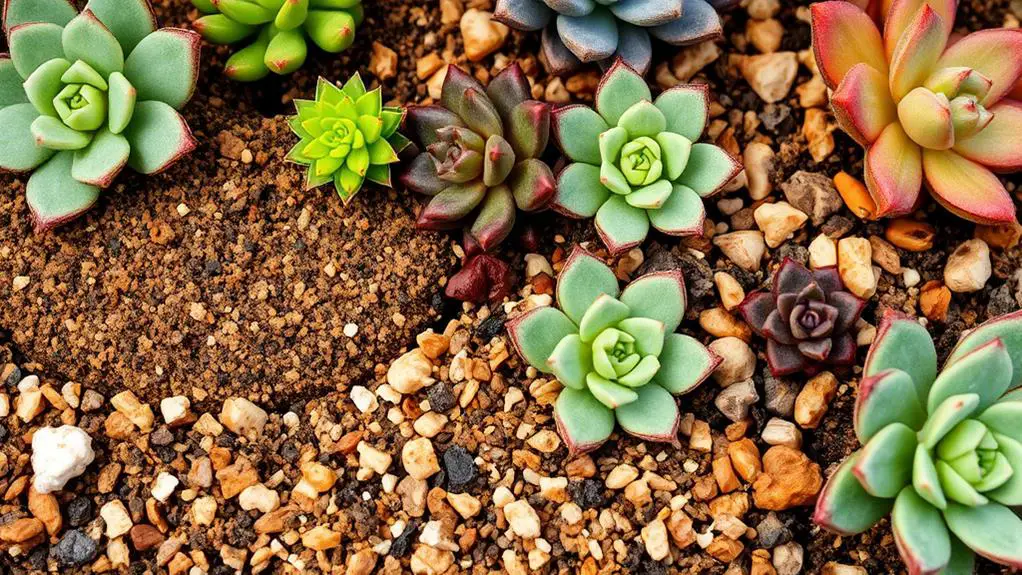
When it comes to growing healthy succulents, the soil mix you choose plays a crucial role. To create the best soil mix for succulents, start with a combination of 3 parts potting soil, 2 parts bark fines, and 1 part perlite or pumice. This mix guarantees proper drainage and aeration, which are essential for succulent health.
Commercial cactus mixes, like those from Miracle-Gro and Black Gold, are great for beginners. These mixes are convenient and provide a good base. However, adding inorganic materials such as perlite, pumice, or coarse sand can further improve drainage and prevent moisture retention, reducing the risk of root rot.
Soilless potting mixes, often containing ingredients like coconut coir and compost, maintain the right moisture balance while promoting root health.
Testing your soil mix by wetting and squeezing it helps you check its drainage performance. If water drains quickly and doesn't leave the soil soggy, you've got a good mix.
Organic Soil Ingredients
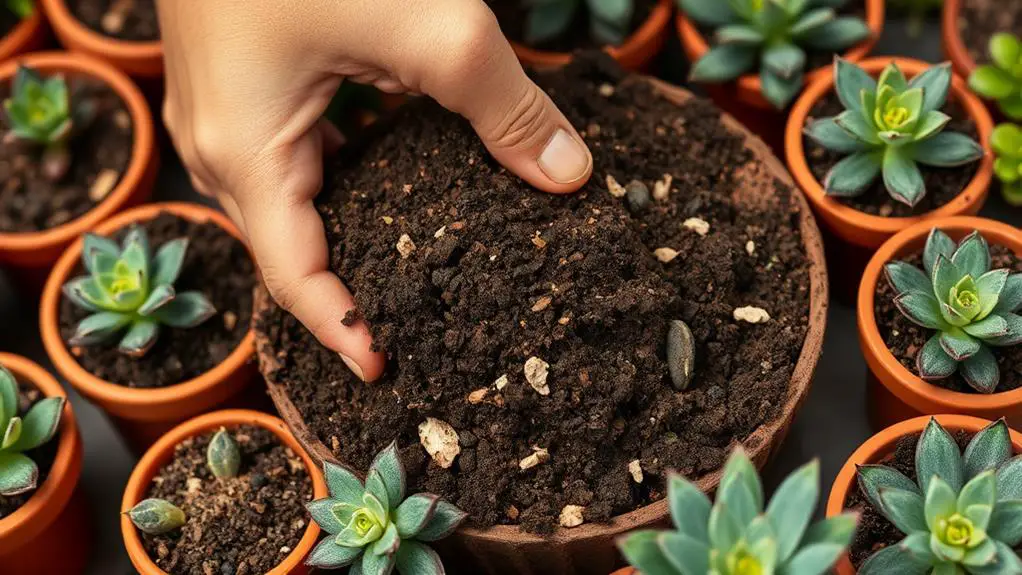
Choosing the right soil mix is just the beginning. For healthy succulents, incorporating organic soil ingredients can make a huge difference. Peat moss is a fantastic option because it retains moisture and provides essential nutrients, while also being lightweight.
However, if you're looking for a more sustainable alternative, try coconut coir. It offers excellent moisture retention and durability without the environmental concerns linked to peat harvesting.
Adding compost to your soil mix is another great choice. It enriches the soil structure and offers a slow-release source of nutrients, ensuring your succulents get what they need over time.
Plus, composting helps recycle organic waste, making it environmentally friendly.
Don't forget about mulch! It helps retain moisture in the soil and slowly releases nutrients as it decomposes. This gradual nutrient release is highly beneficial for succulent growth.
Lastly, consider using manure, but make sure it's well-composted. Properly composted manure improves soil texture and adds crucial nutrients, promoting healthy root development.
Combining these organic ingredients in your soil mix will set your succulents up for success, ensuring they thrive and grow beautifully.
Inorganic Soil Ingredients
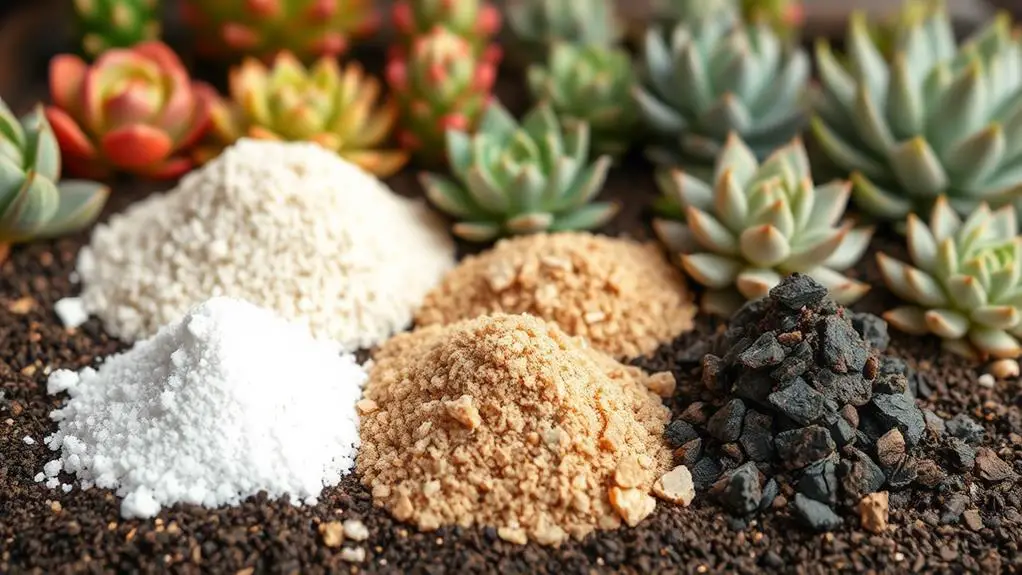
Inorganic soil ingredients are vital for creating the ideal environment for your succulents. They help prevent root rot by improving drainage and aeration, ensuring your plants stay healthy.
Inorganic materials like perlite and pumice are excellent for enhancing drainage in your succulent soil mix. They allow water to pass through easily, preventing excess moisture from harming the roots.
Calcined clay is another great component. It retains essential nutrients while still letting oxygen flow to the roots, promoting healthy growth.
You can also add chicken grit, which is made from crushed granite. Its coarse texture aids in drainage, ensuring your succulents' soil doesn't hold too much water.
Pea gravel is a useful inorganic option too. It doesn't decompose, making it perfect for improving drainage in clay-heavy soils. This is vital because succulents thrive in well-drained conditions.
For an ideal succulent soil mix, try a ratio of 3 parts potting soil, 2 parts bark fines, and 1 part perlite or pumice. This mix balances moisture and aeration, supporting your succulents' roots and overall health.
Top Fertilizers for Succulents
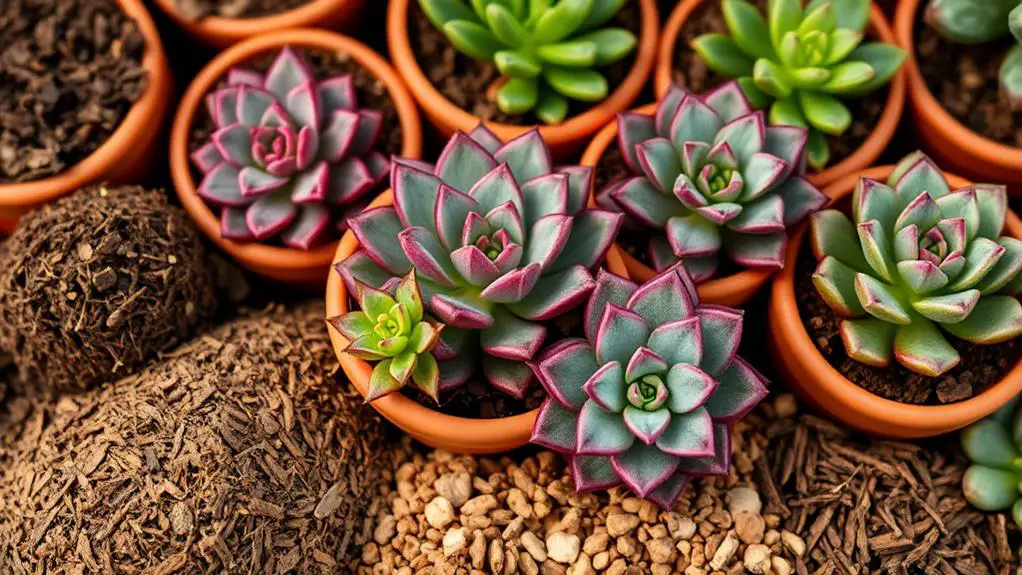
To keep your succulents thriving, you'll need to select the right fertilizers that cater to their unique needs. The best fertilizer for these plants often has a low nitrogen content with a balanced NPK ratio of 2-4-2. This guarantees healthy growth without making your succulents leggy.
Organic fertilizers, such as compost tea, provide essential nutrients and beneficial microbes. They improve soil health and promote slow nutrient release, which is ideal for succulents. During the active growing season—spring and early summer—fertilize every 2-4 weeks with diluted solutions to prevent over-fertilization and root burn.
Common signs of nutrient deficiency in succulents are yellowing leaves and stunted growth. If you notice these, your plants might need extra nutrients.
Here's a comparison of popular fertilizers:
| Fertilizer Type | Benefits |
|---|---|
| Miracle-Gro Succulent Plant Food | Easy to use, balanced NPK ratio |
| Compost Tea | Organic, improves soil health |
| Banana Peel Solution | Natural potassium boost |
| Coffee Grounds | Adds nitrogen, improves soil texture |
Succulents need proper care to flourish. Using the right fertilizer can make all the difference. Miracle-Gro Succulent Plant Food and homemade solutions like banana peels or coffee grounds offer excellent options for a natural nutrient boost.
Fertilizing Tips and Tricks
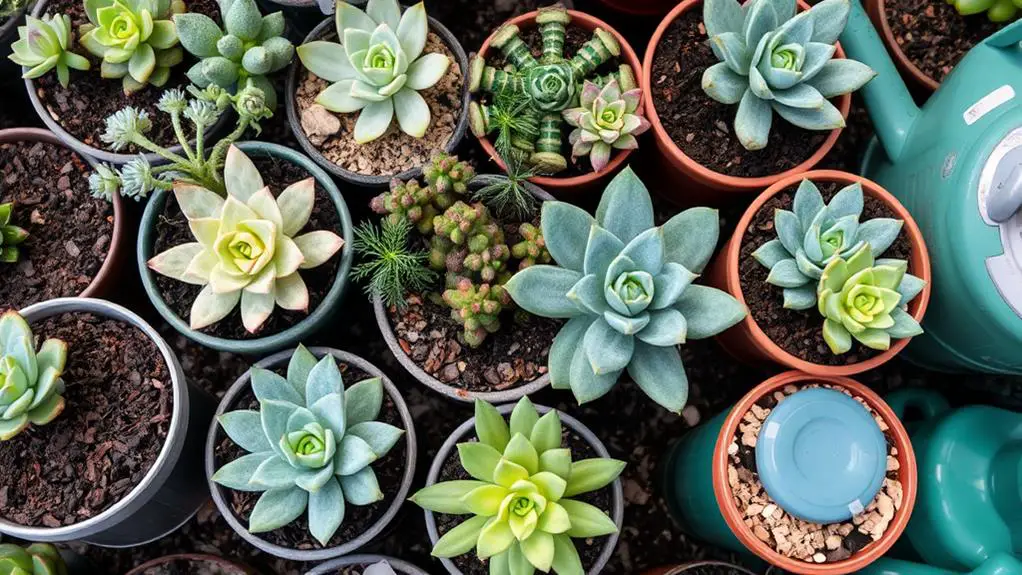
Fertilizing your succulents effectively requires a few key tips and tricks to guarantee they get the nutrients they need without the risk of over-fertilization.
First, always fertilize succulents during their active growing season, which is in spring and early summer. During this time, apply a diluted fertilizer solution every 2-4 weeks. This promotes healthy growth and prevents weak, leggy plants.
Choose a well-balanced fertilizer with a low nitrogen ratio, like a 2-4-2 or 1-1-1 NPK ratio. This type of fertilizer supports root development and flowering without causing nutrient deficiency or excessive growth.
Keep an eye on your succulents for signs of nutrient deficiency, such as yellowing leaves, and adjust your fertilization routine based on whether your plants are indoors or outdoors.
Consider using organic options like compost tea, which can enhance soil health, improve moisture retention, and provide a balanced array of nutrients.
However, remember to avoid fertilizing during the dormant period in fall and winter. Over-fertilization can lead to root burn and salt accumulation, so always err on the side of caution.
Frequently Asked Questions
What Kind of Soil Is Best for Succulents?
You should use well-drained, porous soils for succulents. A mix of 3 parts potting soil, 2 parts bark fines, and 1 part perlite or pumice works best. Specialized mixes like Miracle-Gro guarantee proper drainage and prevent root rot.
What Is the Best Fertilizer for Succulents?
You should use a low nitrogen fertilizer with a balanced NPK ratio like 2-4-2. Organic options, such as compost tea, are great. Fertilize every 2-4 weeks during spring and summer with a diluted solution.
Is Miracle-Gro Potting Soil Ok for Succulents?
Miracle-Gro potting soil isn't ideal for succulents due to its high moisture retention. You can amend it with perlite or sand for better drainage, but a cactus and succulent mix is a more suitable choice.
Are Coffee Grounds Good for Succulents?
Yes, coffee grounds can benefit succulents in moderation. They provide nitrogen and improve soil structure. However, don't use them excessively, as they can cause soil compaction and water retention. Use them as compost or a light top dressing.
Conclusion
You've got all the info you need to keep your succulents happy and healthy! With the right soil mix and fertilizers, your plants will thrive. Remember, a well-draining mix and low-nitrogen fertilizers are key. Don't forget to feed them during the growing season and watch for any nutrient issues. You're ready to create a perfect environment for your succulents. Happy gardening, and enjoy watching your plants flourish! Keep an eye on them, and you'll do great.

